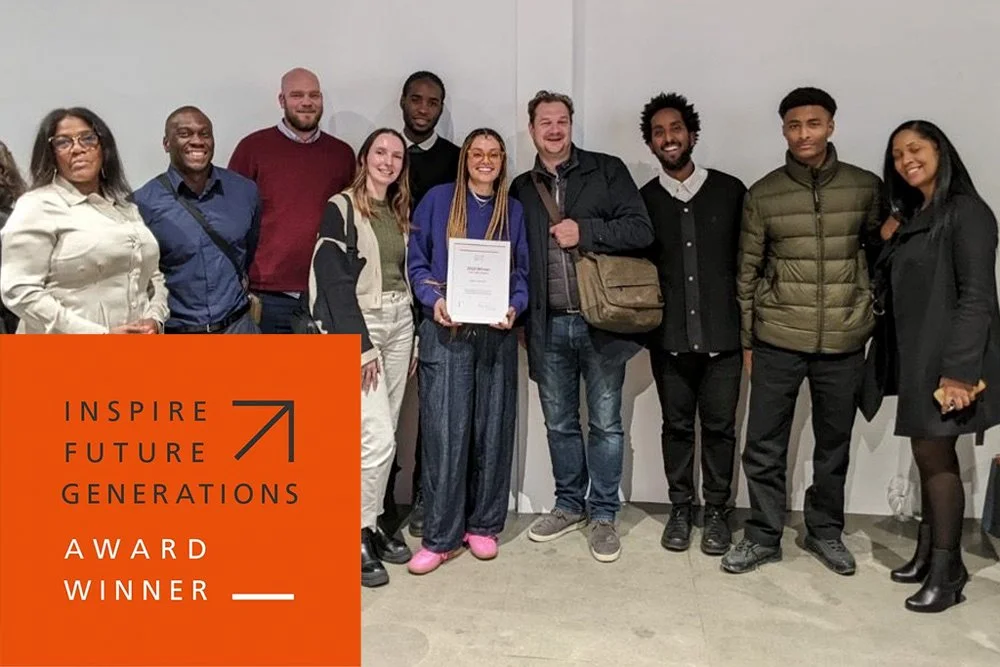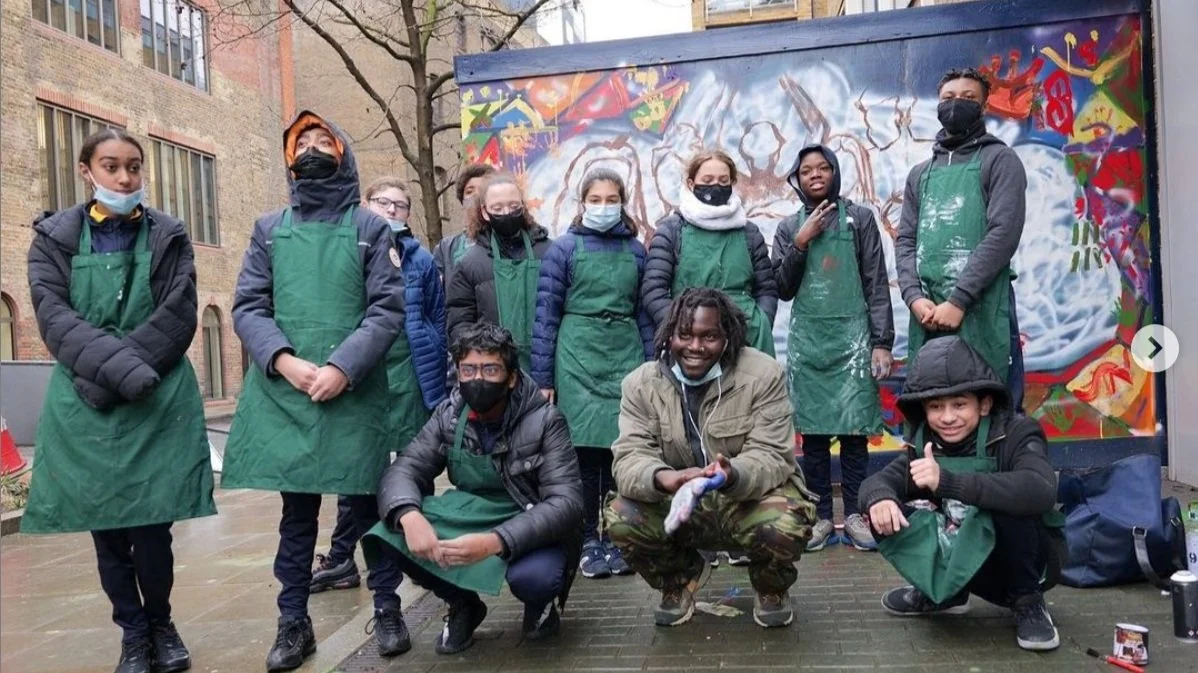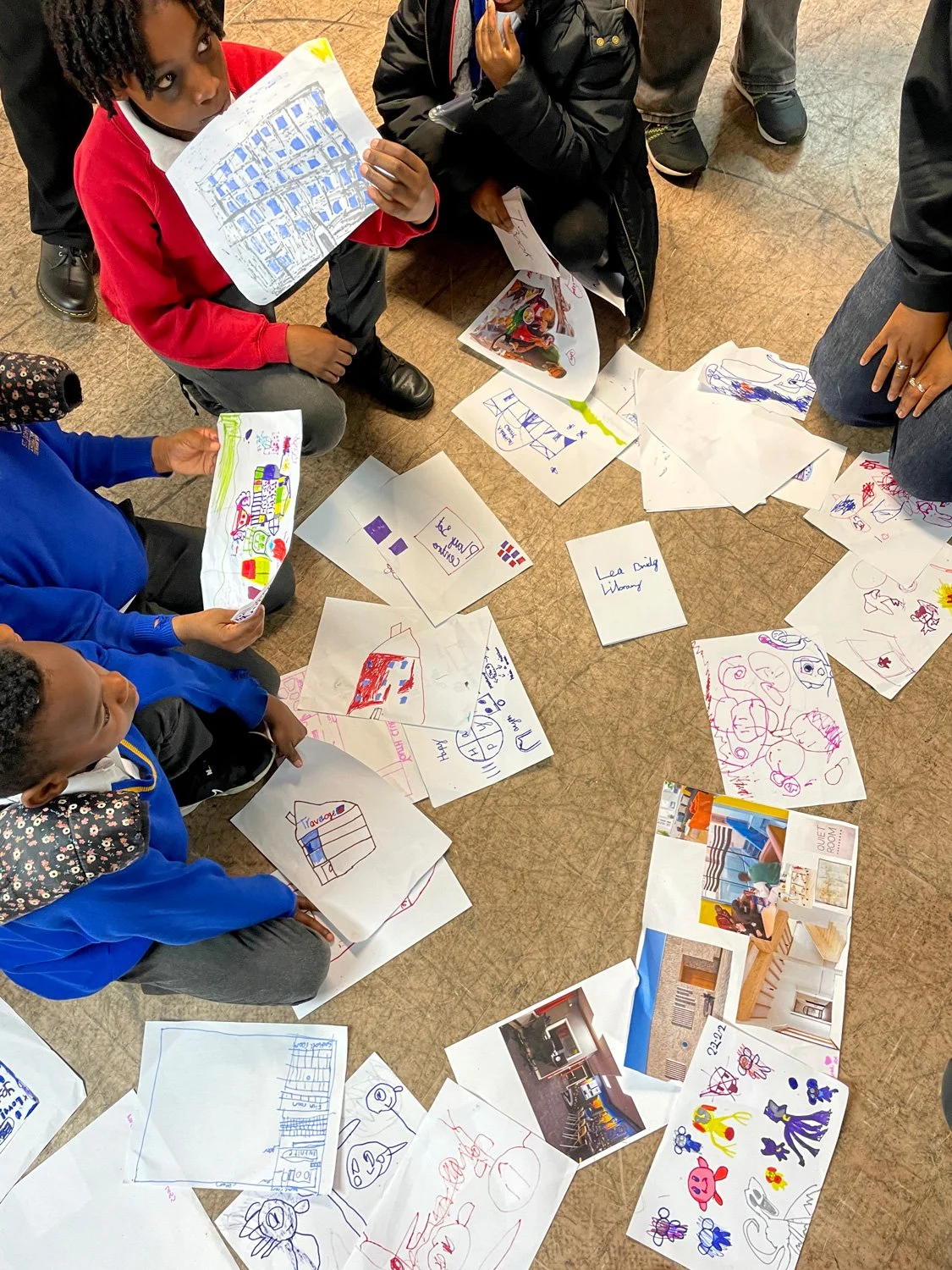Working with young children at Roskely School, to imagine how they might change their neighbourhoods
Equity embedded. By designing fairly, we make accessible, honest and representative buildings.
We believe that architecture and the process of building can no longer be an extractive process. Freehaus has a commitment to ensuring our projects are underpinned by a strong ethos centred around making meaningful contributions to the communities our projects will serve, creating better access to culture and institutions and generating wider benefits to the environment.
We also believe in taking the time to help nurture others along the way, sharing design authorship with local people, recognising local skills and experience, so that our projects speak to and of the communities who will inhabit and thrive in the buildings we design.
In adopting these approaches we seek to create change in our profession to broaden authorship, to create agency for those often overlooked to affect change in their built environment, and pave the ways to more equitable and representative places.
We expand on our working methodologies below.
“The Africa Centre is an outstanding project in the portfolio of Good Growth Fund schemes - connecting a global agenda with the local community of Bankside. We’ve been lucky in having you helping the client making it happen.”
Tim Rettler, Greater London Authority
Angell Town Project Space - with Resolve + POor Collective
Social Value – Creating Agency
We are committed to ensuring that social value does not become a catch all term used across the industry to set a generic approach to working with the communities and people our buildings serve.
And so our practice is actively committed to supporting and nurturing relationships with communities, creating as much space at the table as we can, so that local people can define what meaningful social value looks like. In doing so we recognise that the medium through which we engage is as important as our message - local people must inform the way in which they are engaged with, to define how good social value quantifiably benefits local people, how it responds to local need and to ensure collaboration opportunities create meaningful agency.
+ -Read more
We pride ourselves on using inclusive & accessible communication tools. We empower local communities to use the tools they know, or feel welcomed towards, to express their creativity and ideas using an accessible vocabulary - to champion the cultural capital familiar to them. Where possible, we draw on means of representation and documentation not typically associated with the profession, such as performance, story-telling and digital media, in order to complement our more traditional architectural tools. Through this, we make city shaping more inclusive, diverse and powerful.We also recognise the important role that local organisations and community-led initiatives can have on the projects we deliver. We work closely with our clients to reflect on existing relationships and networks to understand where things have gone well and where things haven’t, so that we can build upon the knowledge that has been established, to tailor our lines of communication and set up for success. On many of our projects we have established community sounding boards which help to remove lines of hierarchy in the project and create a positive forum for all key stakeholders to participate and contribute. Forums such as these can help unlock current community needs and ensure they factor into our concurrent design thinking. Such groups, comprising a breadth of local need and offering a variety of perspectives can help ensure the project has a benefit outside its red-line boundary.
Embedding Opportunities and Equity
Not only do we seek to inspire local people through our projects, but we actively carve a path for them to shape the built environment. Across all our projects we look for opportunities for local people to join the team, to receive further mentoring and design experience as Project Ambassadors. Freehaus actively provides paid employment opportunities for young people to undertake a studio placement, paid at London Living Wage, gaining first-hand practical experience across various design stages.
In addition to this, since 2017 Freehaus has participated in the Career Development Centre (CDC) Mentoring Scheme operated by the University of Westminster, providing students with the opportunity to gain insight into professional practice and develop their employability skills in advance of graduating. We have welcomed students for short term placements to expand their experience of architectural practice whilst undertaking their undergraduate studies.
+ -Read more
Our practice has a dedicated social value lead, helping create meaningful work experience placements and a diverse programme of welcome activities. Our commitment to creating social value and broadening agency in the profession is demonstrated by our involvement in:- Freehaus director Jonathan Hagos appointment as a Ardagh Young Creative mentors for the Design Museum; and as an RIBA practice mentor to help create and strengthen pathways into the profession
- We took part of the RIBA schools programme ‘Architecture Ambassadors’, to partner with a local school to help give children an insight into architecture and to inspire them about the potential of the built environment. Our engagement approach was recognised in the Mayor of London’s primer for Designing with Young People.
- Our membership to the London Practice Forum (LPF) where our charter commits us to more ethical practices and which includes a commitment to the Mayor’s Equality and Diversity and the Future of London’s Speaker Diversity Pledge.
- Practice Director Tom Bell role as RIBA student mentor with Oxford Brookes University to help create and strengthen pathways into the profession.
- Freehaus Director Jonathan Hagos’ role as External Examiner at Oxford Brookes University since 2020, supporting the school of architecture in defining and meeting their academic and pastoral commitments.
- Our role offering professional mentorship working with Beyond the Box aimed at uncovering the hidden creative talents aged 16 to 25 residing in the London boroughs of Hackney and Tower Hamlets
- Practice Director Tom Bell’s role on the RIBA Guerilla Tactics steering group since 2022 and helping guide the conference agenda towards pressing industry concerns.
- Supporting the London School of Architecture’s Saturday Club programme
- Supporting the 2023 Haringey Creates and Made by Tottenham Careers Fair
- Supporting the 2024 Beyond the Box x Build Hollywood mentoring programme
A mural commission for local young people for The Africa Centre, Southwark.
A young person design workshop at Angell Town, Brixton.
Our pop-up engagement space at Acton Carnival
Our Role in the Profession
Freehaus was established in 2012; with Tom and Jonathan having previously worked together at another London practice from 2008, working on a range of education, civic and community projects.
Since our founding we have been committed to alternative modes of practice, often working around the fringes of the profession to shape Freehaus and our practices values around principles of fairness and public good.
We are committed to showing the impacts that inclusive and equitable design can have on the way we live and the world around us.
+ -Read more
In more recent years we have actively taken on roles and appointments outside of the practice which has helped to inform our working methodologies and support the reshaping of our profession:- Mayor of London design Advocate
- Quality Review Panel Member – OPDC, LLDC, Harrow and Royal Borough of Greenwich
- Hackney Regeneration Design Advisory Group Member
- External Examiner Oxford Brookes
- RIBA Practice Student Mentor
- RIBA Guerrilla Tactics Steering Group Member
- RIBA Architecture Ambassador
- Design Museum Creative Mentor
- University of Westminster Mentoring Practice










